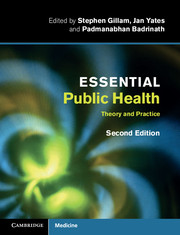Foreword to the first edition
Published online by Cambridge University Press: 05 August 2012
Summary
Public health knowledge and practice is derived from a number of different academic fields. This makes the specialty very stimulating but immediately confronts the student with a dilemma: breadth versus depth. This book strikes the right balance between the need for coverage of several relevant disciplines with the detail required to understand specific public health challenges. We all need to use the frameworks described here to locate our learning and practice.
The three-domains model of public health practice described in the introduction has utility for all health workers – and we need to reflect on the location of information we use at the intersection of the three domains. Modern information technology provides assistance to health practitioners, e.g. through search engines and internet resources, but the growth in information and specialised knowledge characteristic of modern health systems can be overwhelming. For practitioners dedicated to improving public health there is always a ‘population of interest’. For example, for the health visitor deprived families in her locality, for the general practitioner a practice population, for the director of public health a whole population and for the paediatrician or children’s lead manager a subset of that population.
- Type
- Chapter
- Information
- Essential Public HealthTheory and Practice, pp. xiiiPublisher: Cambridge University PressPrint publication year: 2012



